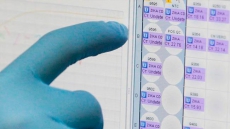WASHINGTON — Donald Trump's sister burst out laughing when a biographer asked about his unusual habit of using a pseudonym to say flattering things about himself to the media.
The biographer recalls that Maryanne Trump noticed an obvious influence when asked about her brother's decades-old tendency to use the aliases "John Miller" and "John Barron" in interviews.
"She said their father did that," biographer Gwenda Blair recalls. "(Trump's father) would call up and be 'Mr. Green.'... He'd pretend to be a spokesman for himself...
"The apple's not falling far from that tree."
The inimitable character of the U.S. presidential candidate wasn't forged in isolation.
His business practices. Showmanship. Wanton exaggeration. Hard-edged competitiveness. Flamboyance. These pieces of the Trump jigsaw puzzle were formed in part by his parents, his family pastor, his military-school experience, and the limousine-riding lounge lizards of Manhattan.
Here are stories of some people who influenced Trump.

Fred Trump, father
On weekends, Fred Trump would wear a suit as he toured his real estate properties. Young Donald would tag along, collecting rent from tenants and business lessons from his dad.
Such pearls of wisdom included never using eight screws on a door when seven would do, or standing beside the door while collecting rent in case a tenant attacked, according to Blair's book, "The Trumps: Three Generations that Built an Empire."
His dad also used schemes to avoid taxes, according to Michael D'Antonio's book "Never Enough." One involved transferring income to his children. He listed them as landlords on his property, charging rent from Trump buildings. Donald's election expenses list rentals of family property and purchases of his son's wine.
Fred Trump told the New York Times in 1976: "Donald is the smartest person I know." Donald became the heir apparent, leapfrogging past his siblings, including one brother who spiralled into alcohol abuse that killed him. Donald vowed never to allow a sip of liquor to touch his lips.

Dad's ties to politicians helped him score early successes. In his 20s, Donald could get a city-hall meeting on short notice. He obtained a 40-year tax writeoff that helped him win his first big Manhattan contract.
Early New York Times stories pointed to Trump as a generous political donor. His even hired the governor's chief fundraiser at a six-figure salary in the 1970s; she introduced him to people who sold him the property for the Trump Tower.
During the Trump Tower project, he demolished old statues on the property, despite a promise to preserve them. He used a pseudonym to escape the PR jam.
In phone interviews with journalists, he posed as a fictitious spokesman: "John Barron." Trump later posed as "John Miller" to tell a tabloid he was dating model Carla Bruni. Bruni denied it, telling London's Daily Mail in 1991: "Trump is obviously a lunatic."

Mary Trump, mother
In his quest for the limelight, he was more like Mom. Trump's first book describes how she was the family extrovert. "I got some of my sense of showmanship from my mother," he wrote in the book, "The Art Of The Deal."
Mary Ann MacLeod was born in a remote village in Scotland, part of a modest fishing and farming family. At 18, she left to visit a sister in New York City. While there, she met Trump's father and stayed.
He also describes her being fascinated by British royalty, glued to the TV at their sight.
"She always had a flair for the dramatic and the grand," he wrote in his book. "My mother loves splendour and magnificence, while my father, who is very down to earth, gets excited only by competence and efficiency."
A 2008 article in The Guardian said Donald's older sister, Maryanne, had visited the Scottish ancestral hometown 24 times. Donald went once since childhood. His sister charmed the locals with some Gaelic phrases; he chatted mostly about his own projects.

Norman Vincent Peale, pastor
From a young age, Trump was assured of his limitless potential. The minister in his family's church was the bestselling author of "The Power of Positive Thinking."
Norman Vincent Peale wrote that God's power can help achieve anything — even material things, even selling vacuum cleaners. Banish all negative doubts from your mind, he wrote.
He also encouraged exaggerating one's greatness: "Make a true estimate of your own ability, then raise it 10 per cent. Do not become egotistical, but develop a wholesome self-respect."
The message stuck. Whether it's crowd sizes, his net worth, or poll numbers, it seems, statistical claims pass through some inflationary filter that resides on the tip of Trump's tongue. Trump has referred to his habit as "truthful hyperbole."
Even the floor numbers in some of his buildings are inflated — he's been known to skip a few at the bottom, which produces a higher number of storeys.

He's married and dated real-life models, yet still exaggerated being courted by Madonna and Kim Basinger.
Trump is especially sensitive about the size of his fortune. It's no accident Clinton teased him about it in their debate. Trump once sued a biographer for saying he exaggerated it. For a comedy roast, he allowed himself to be grilled on every topic — but reportedly declared that one off-limits.
"It's not that he distorts (intentionally)," says the biographer D'Antonio, recalling his four lengthy interviews with Trump.
"He does it so much that it's like breathing for him."
Trump has cited Peale as an important influence. The minister's family, however, now suggests Trump misapplied the lessons.

Col. Theodore Dobias, coach
A Second World War veteran took under his wing a young cadet nicknamed "DT" — Donny Trump.
The boy was sent to military school for five years. His parents grew exasperated with his behaviour, which included apparently punching a music teacher and carrying switchblades onto the subway like the characters in "West Side Story."
Trump's classmates say their alma mater helped straighten him out: "He was a bit of a wild-ass when he was younger," recalls schoolmate Jack Serafin.
They say the academy instilled a sense of discipline. Cadets started the day at 7 a.m. and had class, gym, and studying until bedtime. Punishments included being slapped with a paddle or being forced to march for hours.
Serafin recalled Trump being friendly and relatively quiet — nothing like the showman he sees today.

He's pulling for his schoolmate to become president. So is Ted Levine, Trump's catcher on the baseball team. Trump boasts he was talented enough to make the major leagues, but the pay wasn't good enough. Levine recalls Trump pitching fastballs that bruised his hand.
The old coach died this year. Shortly before, Dobias strode up to the podium at a homecoming ceremony with Trump and said: "He'll make a damned good president, won't he?"
He described his ex-player to D'Antonio. Dobias said he tried instilling the lesson of legendary football coach Vince Lombardi that winning isn't everything — it's the only thing: "Donald picked right up on this... He always had to be number one, in everything. He was a conniver even then. A real pain in the ass. He would do anything to win."

William Zeckendorf, developer
Trump set his sights beyond his father's outer-borough real-estate empire, on Manhattan. Military-school classmates recall marching through midtown for a Columbus Day parade, and Trump talking about reshaping the surrounding skyline.
Just like William Zeckendorf.
When early profiles of Trump ran in the New York Times and Wall Street Journal, they compared him to the real estate legend.
A big man and big personality, Zeckendorf rode around town in a Cadillac limousine with a car phone and personalized license plate, "WZ." Zeckendorf, the grandson of German immigrants, got married four times, craved media attention and lived for monumental projects — he assembled dozens of land parcels that became the UN plaza.
Comparisons were perhaps inevitable when another German immigrant's grandson rolled around Manhattan in a phone-equipped Cadillac with the license plate "DJT," dressing flamboyantly and courting press attention.
Trump drew lessons not just from Zeckendorf's successes, but also his failures. Zeckendorf’s business went bankrupt. Trump would suffer similar setbacks, but in 1983 said: "Having seen the way he went down taught me to be overly (conservative)."

Born four decades before Trump, Zeckendorf shared a penchant for exaggeration.
In his autobiography, Zeckendorf bragged about his role in developing the Place Ville Marie office complex in Montreal. In defiance of the historical record, he bragged the building turned Montreal into Canada's No. 1 city after opening in 1962.
Trump also boasted of a Montreal conquest.
His first wife, Ivana, was modelling there when they met. Trump told newspapers she was an Austrian Olympic skier, and was the No. 1 model in Canada. At first, newspapers credulously reported those details.
Eventually media figured out she was not Austrian, but Czech; not an Olympic skier; and a damning Spy magazine piece suggested this supposed No. 1 model in Canada had actually been the No. 2 or 3 favourite model for a Montreal coat manufacturer.

Roy Cohn, lawyer
A local character with a thick New York accent, a boxer's nose and a pugilistic streak he brought to the courtroom, this lawyer had friends in high places and in the dark, crime-ridden underbelly of the construction industry.
Cohn joked about having spent two-thirds of his adult life under criminal indictment — but always beat the rap. He was known nationally as the former aide to the red-baiting demagogue Joseph McCarthy.
His approach to politics, and the law, was summed up in a 1978 Esquire magazine profile: "To Cohn, a courtroom is not a forum but a battlefield where his enemies, he believes, try to kill him."
He grew close to Trump. It began as Trump's name first appeared in the New York Times, in 1973. The federal government had sued the family business for housing discrimination, citing evidence it avoided renting apartments to black people.
Trump reached out to Cohn.

Trump later wrote that his father was thinking of settling with the government, and he sought Cohn's advice. Cohn told him: Swing back twice as hard. "(Cohn) said, 'My view is tell them to go to hell and fight the thing in court,'" according to "The Art of the Deal." "That's when I decided Roy Cohn was the right person to handle the case."
They counter-sued the U.S. government for $100 million in reputational damages — which a judge threw out as a nuisance suit. In 1975, the sides settled the main case. The Trumps promised to give African-Americans a better chance at housing.
Cohn's influence was lasting.
He introduced Trump to national political operatives. That's how he met former Richard Nixon aide Roger Stone, who remains a friend and adviser. In that circle, he met his later campaign manager Paul Manafort, a lobbyist with pro-Vladimir Putin connections.
Cohn later felt betrayed. As he was dying of AIDS in the mid-1980s, Trump avoided him for a while. In the 1992 book, "Trump: The Deals and the Downfall," a stunned Cohn said: "Donald pisses ice water."

Conclusion
Trump's biographers debate a perennial question: is he the product of nature or nurture?
Michael D'Antonio leans toward the latter. He believes Trump developed a longing for attention growing up, with his mom sidelined by lengthy ailments and his dad distracted with business.
He points to several psychology books on narcissism that cite Trump as an example — "Help! I'm In Love With A Narcissist," from 2005; "The Narcissism Epidemic," from 2010; and "When You Love A Man Who Loves Himself," from 2005.
Journalists who've spent time with Trump marvel at his passion for discussing press clippings and the magazine covers he collects.
Another biographer, however, notes his siblings are all different.
Blair says Maryanne, the judge, is introspective and, unlike her brother, interested in family history. Fred Jr. avoided the family business to become a pilot. Robert did enter the business — and the biographer says he's known as the ''Nice Trump.'' Elizabeth is a banker, and as far as Blair knows has never granted an interview.

She offers an anecdote to illustrate these differences. It's the funeral for Trump's father. The presiding minister is Peale, who wrote the positive-thinking book.
The Trump siblings deliver strikingly different eulogies.
"They (all) told these warm stories. One read a poem," Blair recalls.
"They had little remembrances of their father, fond remembrances. Then Donald spoke and he spoke only about himself and his achievements. It wasn't about his father. It was about him."





